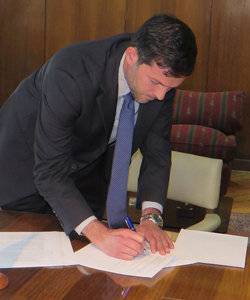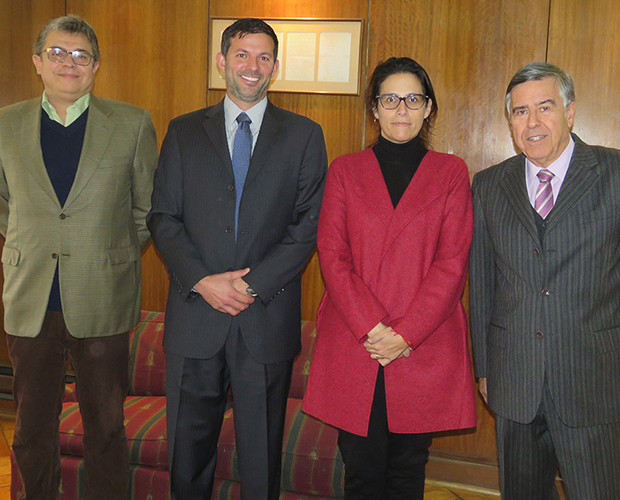Linked in Latin America
Under the leadership of Assistant Professor Gordon McCord, GPS bolsters its Latin American connections with a second student exchange program in Chile
July 17, 2017 | By Sarah Pfledderer | GPS News
Deepening its links in Latin America, the UC San Diego School of Global Policy and Strategy (GPS) minted a new memorandum of understanding (MOU) for student exchanges with Universidad de Chile — Instituto de Estudios Internacionales (IEI).
Among the oldest postgraduate centers in Latin America, IEI emphasizes interdisciplinary analysis of topics such as international law, international relations, political science, history and the international economy.
It’s the perfect pairing for GPS’s specialties in the Pacific region, as well as its strengths in quantitative analysis, explained Dorotea López Giral, assistant professor of international economics and commercial policy at Universidad de Chile.
“GPS and IEI have the will to broaden their students’ world understandings and share the best of their programs and ideas,” she added, and forecasted that through exchanges, “students will gain a multidisciplinary approach to global problems and challenges, acquiring new tools to deal with public international policies.”
GPS Assistant Professor Gordon McCord, who oversaw the MOU’s creation, views the new partnership not just as an adventurous means for students to fulfill curriculum requirements, but as a juncture to make an authentic impact, globally.
“The 21st century involves a rebalancing of the economic center of gravity toward the Pacific, and the relationships and amount of trade between Latin American countries and Asia are growing very fast. Yet the expertise about each other in the two regions is very low,” McCord said. “That kind of arbitrage is a niche GPS is uniquely capable of filling. The idea of a student who can bridge those two things — a student who has done work on Asia or has access to that knowledge at GPS but is focused on Latin America — is really exciting.”
“This is an interesting pivot point for Asia and Latin America, and GPS can locate itself right in the middle.” — Assistant Professor Gordon McCord
This MOU is the second to come to fruition under McCord’s watch and one in a likelihood of more student exchange programs between GPS and Latin American institutions.
In addition to its partnership with IEI, GPS has an existing MOU with Pontificia Universidad Católica de Chile.
The notion for these student exchange programs was set in motion during a GPS faculty trip to Chile two years ago. Coordinated by McCord and attended by Professors Tai Ming Cheung, Ruixue Jia and Barry Naughton, that visit to Chile in 2015 showcased the ways in which GPS’s expertise in Asia is advantageous to scholars in Chile, given the country’s reliance on China as a trading partner.
 “GPS’s focus in the Asia-Pacific region and emphasis on real-word solutions for public policy challenges makes it a perfect match for our students as they look for innovative ways to address local and global challenges,” said Francisca Reyes, who leads the master's program in political science at Pontificia Universidad Católica de Chile. “At the same time, our university offers GPS students the possibility to develop a unique academic and personal experience in a consolidated program in a country that is an active member of the Pacific alliance.”
“GPS’s focus in the Asia-Pacific region and emphasis on real-word solutions for public policy challenges makes it a perfect match for our students as they look for innovative ways to address local and global challenges,” said Francisca Reyes, who leads the master's program in political science at Pontificia Universidad Católica de Chile. “At the same time, our university offers GPS students the possibility to develop a unique academic and personal experience in a consolidated program in a country that is an active member of the Pacific alliance.”
Echoing Reyes’ remarks, McCord added that both Pontificia Universidad Católica de Chile and IEI are good fits for GPS students from a curricular viewpoint and particularly for those in the School’s Latin America track.
“Chile, specifically, is an interesting country because it’s had the region’s most successful economic model over the last 30 years,” McCord said, and gave a nod to IEI’s faculty expertise on areas such as trade and international affairs.
On the flip side, he said, students in Chile who participate in student exchanges with GPS stand to gain more than a regional expertise from the School. There also are opportunities to hone their analytical skills, including in research design and spatial analysis, plus an understanding of how science, technology, engineering and mathematics (STEM) fields coincide with policy.
Not one to pigeonhole the possibilities, McCord concluded that students from all Latin American countries could benefit from being at GPS and vice versa.
“GPS has a lot to offer Latin American countries that predominately trade with China — Brazil, Chile, Peru, Colombia, Mexico. Specifically, policymakers in these countries could benefit from our deep expertise on Asia,” McCord said. “This is an interesting pivot point for Asia and Latin America, and GPS can locate itself right in the middle.”
Incoming GPS students interested in student exchange programs in Latin America can contact Assistant Professor Gordon McCord for details.

